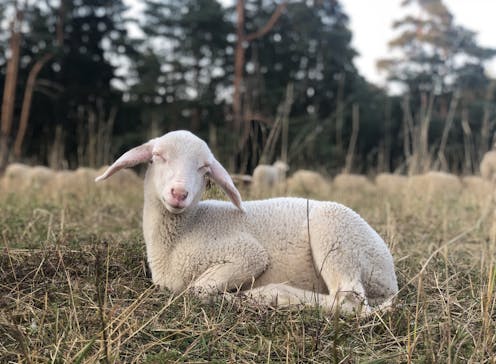No country for old poets? Barry Hill’s Lamb is a work of vitality and rejuvenation
- Written by Stuart Cooke, Associate Professor, Creative Writing and Literary Studies, Griffith University

If any generalisations can be made of Australian poetry, one of them might be that Australia is no country for old poets. It is hard enough finding an audience while you’re alive. Then, when you’re no longer around to read or speak of them, your poems will likely slip into oblivion.
A precious handful of late Australian poets are still read today, and an even smaller handful of those are in print. For a brief glimmer of time, UWAP was publishing the collected works of canonical figures such as John Shaw Nielson, Francis Webb and Judith Wright, but that series is now defunct.
Review: Lamb – Barry Hill (re.press)
Nowadays, a glance at the shortlists of national poetry prizes, or at those who judge them, might suggest poetry has become an articulation of youth. Much like pop music, its originality is determined by paratextual proclamations of its newness. This “newness” might have more to do with the poets themselves than their poetry: the youngest are, by definition, the newest.
Ezra Pound’s famous modernist injunction to “make it new” was concerned not so much with novelty, but with the imperative to sift through and reinterpret the strata of the past. This fuels and structures his epic, The Cantos.
“Make it new” has become axiomatic in the century since the phrase appeared in Pound’s book of essays of the same name. Too often it is forgotten, however, that the injunction was not of Pound’s own making, but one that he encountered during his study of Confucian moral philosophy. Most likely, the phrase belongs to the neo-Confucian scholar Zhu Xi (1130–1200 AD).
Modernism, in other words, is Chinese, and it is very old.
Lyrical illuminations and gruff talk
Tu Fu (712-770) was a central poet for Confucian scholars, and he is central to Barry Hill’s latest collection Lamb. The book’s second section is titled Sleep-Out with Tu Fu.
The Tang dynasty poet and politician provides Hill with “spikey, deceptive dislocations” that help him mediate an expansive, global, but also very domestic vision: while Tu Fu cares for rebel soldiers beneath a “sullen, 9/11 sky”, bombs go off in Kabul, and the Australian poet watches The Sopranos with his son.
Hill is not a “new” poet. Lamb is his 13th collection and he turned 80 while writing it. Many of us might feel like we’ve turned 80 after writing a book. But thankfully in Lamb any such exhaustion is tempered by youthful rejuvenation – personified by the poet’s first granddaughter.
Hill’s temporal scope lies between Tu Fu and his newly born granddaughter. He listens to the centuries, then speaks of his loved ones, his families.
Much in the manner of Judith Wright, Hill’s ongoing despair at a century of near-uninterrupted global conflict is countered by his joy at life’s capacity for renewal. Thus, Lamb blends insightful, impatient and powerful commentary on Afghanistan, Gaza and Ukraine with grandfatherly reflections on birth and love, which find their locus in the titular character of Lamb, at once a pseudonym for the poet’s grandchild and a counterpoint to the book’s second, more prominent persona, Fossil.
Fossil’s name is perhaps a little too evocative of John Berryman’s Mr Bones, from the iconic Dream Songs (1969), for Hill is nothing like Berryman. Devoid of Berryman’s sonic technics, Hill’s poems are tonally much flatter. In many ways, his voice is closer to Les Murray’s vernacular, but he has little in common with the more refractive and spectacular theatrics of Murray’s best work.
Instead, Hill’s closest contemporary kin might be poets like Martin Langford and the late Martin Harrison. All three tend to privilege looser, essayistic and even conversational modes that can combine dogged philosophical enquiry with lyrical illumination.
Hill’s poetry is more muscular than either Harrison’s or Langford’s, however. This collection is full of Fossil swimming in the ocean, doing manual labour, wanting to punch men in the face or string them up, and lots of swearing and gruff talk about Yanks and blood and tanks. We shouldn’t be too dismissive, though. While Fossil is largely an ironic figure, he also reflects much of Hill’s own vitality.
A poetic explorer
Hill is one of the great explorers of Australian poetry, confident across cultural as well as temporal gulfs. One of the reasons that his oeuvre is so significant is that it charts in considerable detail Australian culture’s attempts to come to terms with itself over the past half-century.
Take, for example, what are arguably Hill’s two most significant poetry collections, Ghosting William Buckley (1993) and The Inland Sea (2001). The former is about William Buckley’s escape from a penal settlement in Southern Victoria in 1803 and his subsequent three decades with the Wallarranga tribe of the Wathaurong nation. No less ambitiously, Inland Sea emerged from a decade spent in the Outback, and attempts to blend Central Australian poetics with Hebraic and Buddhist songs.
With Wright and Harrison, Hill shares a conviction that Australian land is fundamentally Aboriginal land. Crucially, this is not just a question for politics or history, or even for poetics, because it is ontological. For poets like these, there is no way poetry can be written in Australia without understanding something of the poetry that has always been written here.
“Country swarms with thought until you reach the cave,” Hill writes in Inland Sea. The cave, we might be tempted to think, is this white man’s body: the inevitable point where comprehension and confusion conflates. For Hill is best known for his study of the monumental, and monumentally flawed, translator of the world’s oldest poetry tradition, T.G.H. Strehlow.





